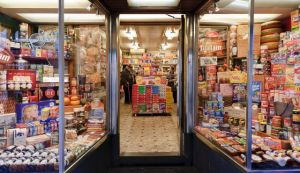What you can learn from grocery shopping abroad
Medical Pharmaceutical Translations • Aug 31, 2015 12:00:00 AM

When I started reading the article “8 Reasons to Be Scared of Foreign Grocery Stores”, I expected to laugh. But although I chuckled in a few places, I mostly felt like author Jeremy Scott Foster, whose website travelFREAK purports to offer “inspired stories for the curious traveler,” was doing readers a great disservice. Not only are grocery stores are a great way to save money when you’re traveling; they’re also a fantastic way to learn about the local culture and practice your language skills.
Here are some of the things you can learn just by strolling down the aisles of a foreign grocery store:
– Trends. Things like organic, vegan, and gluten-free food are all the rage in the US right now. Is it the same for the country you’re visiting? The answer might be surprising.
– Shattered stereotypes. One thing I will say can be negative about a foreign grocery store experience is that it can squash some of your illusions. Like guess what? A lot of Italians buy pre-packaged pasta, instead of making it at home or savoring it at a trattoria. And there are actually some French people who prefer the convenience of picking up a mass-produced baguette on the shelves of their grocery store, rather than stopping by the boulangerie on the way home.
– Intimate secrets. Can you easily find and buy things like sanitary napkins and condoms or do you have to go to a pharmacy? Is toilet paper sold where you are, and, if so, what’s it like? The French, for example, have a fondness for dyed and perfumed rolls.
– The progress of globalization. In most places, I can tell you there’s almost a 100% chance the grocery store sells Coca Cola. What other products have crossed borders and how are they marketed to local shoppers?
– Cost and consequences. Prices can vary widely from place to place, and this can have a major cultural impact. For example, fruit’s so expensive in Japan that it’s often given as a gift.
Grocery stores are also a treasure trove for language learners. Here are just a few ways they’ll help you boost your linguistic prowess. (Note: I’d advise doing most of these at a time when the store isn’t crowded, so you won’t end up stressed out like Foster.)
– Conversations – You’ve probably had at least a few exchanges with fellow shoppers at your grocery store. Whether it’s asking if you know where something is or making a random comment they expect you to react to, people can get chatty, and that’s not (always) an exception overseas. And even if you don’t have any discussions with customers, you’ll get a chance to at least practice basic greetings and polite words with the cashier.
– Numbers – One of the hardest things to learn in a foreign language is numbers. When I was struggling with this in French, I’d carefully listen as the cashier gave the total. Then, I’d check my answer by looking at the cash register display screen (and do a subtle victory fist pump if I was right).
– Reading – Choose an item or items and read its product description. If you know what everything means, bravo – and if you don’t, that will give you more vocabulary to learn.
Not all foreign grocery stores are like what Foster describes in his article, but they all offer an interesting glimpse into the everyday lives and language of their regular shoppers. So if you have some downtime on your next trip, get thee to the local grocery!
#aiatranslations #foreigngrocerystores #learningaforeignlanguage #translations
